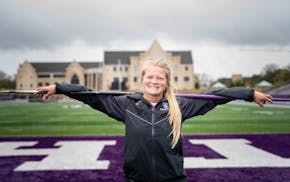Running Aces Harness Park's general manger says that including the Anoka County track in a racino proposal at the Legislature would be a low-risk gamble that would create a minimum of 500 jobs while generating more state tax revenue.
"You can't have a law that creates benefits for just one licensed entity," Running Aces General Manager Robert Farinella said of Racino Now's proposal to commit $40 million to a Vikings stadium if the state will agree to slot machines at Canterbury Park in Shakopee.
Running Aces, which begins its third season of live racing on June 1, was left out of the latest racino proposal because of opposition from northern Minnesota tribes, said Mary Manney, deputy executive director of the Minnesota Racing Commission, which first learned of the proposal when she received an e-mail from Randy Sampson, president of Canterbury Park, just before an announcement was made.
But Running Aces, in Columbus, is 60 miles from Grand Casino in Hinckley, Farinella said. Canterbury Park is virtually next door to Mystic Lake Casino in Shakopee, he noted.
"I don't know what's driving this," Farinella said. "It's certainly more than just consideration for current competition in the marketplace.
"We believe that without us as part of the package, the optimum tax value to the state will not be realized."
John McCarthy, executive director of the Minnesota Indian Gaming Association, said last week that any changes would not lessen the resolve of northern tribes to oppose a single racino at Canterbury Park. But a spokesperson for the Mille Lacs band said the tribe believes racino gambling at Running Aces would more likely affect business at the Grand Casinos in Hinckley and Mille Lacs.
"In hearings that I've sat in, prior to the bill being introduced, most of the opposition came from Grand Casino," Manney said. She said Hinckley city officials also opposed racino gambling at Running Aces.
Farinella said housing a racino at Running Aces would mean construction jobs (in addition to 500 other new jobs), thus helping Anoka County and the city of Columbus.
"The issue of racino is not for or against Native American gaming," he said. "No one is trying to change that."
The harness track cost $64 million to build, then stumbled out of the gate, losing $4 million its first racing season. The track was sold and, while business has improved by nearly 12 percent in the past year, "we're not exactly reaching the economic targets we set for ourselves," Farinella said.
Paul Levy • 612-673-4419
Anderson: For opener, fishing will be fantastic — and catching will be great

As unsolved Minneapolis homicides stack up, families of victims wait for justice

Minneapolis residential property taxes could rise steeply in 2025

'I'm a living miracle.' Tommies athlete goes from broken bones to broken record

